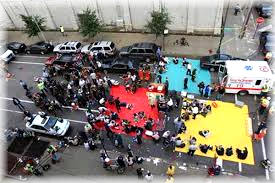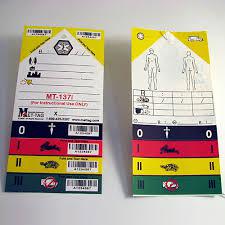by Dawn Kennedy.png)

Triage, French for “to sort,” is “1. the process of sorting victims, as of a battle or disaster, to determine medical priority in order to increase the number of survivors. 2. the determination of priorities for action in an emergency.” (1) The actual process of triage on scene is rather straightforward. The START system (Simple Triage and Rapid Treatment) has been around since 1983, and is a standard system of determining the priority of patient care. Patients are sorted by color; Black, Red, Yellow, and Green. According to the National Institutes of Health, START is the most common algorithm in the U.S. today. There are several states that require a Trauma Triage Course for certification or as CEUs for EMS providers. An excellent resource introducing the Principles of Triage systems is available in an online presentation here. The focus of this article isn’t the system and process of triage; however, it’s the care of a first responder who is faced with not only managing the difficult and complex scene, but also with making the heart wrenching decision about who gets treated, and in what order (2).
The First Decision May be the Hardest
The safety of the scene may be the first hurdle, and making the decision to wait may be the hardest choice a responder has to make. There are scenes that you CANNOT enter, no matter the victims in your field of view. There may be children screaming in pain, and you MUST wait. Your size up is overwhelming. Your first instinct is to help, but you and your crew will become additional casualties if you proceed. Hazmat, active shooter, downed power lines, structural collapse are all examples of scenes that you should NOT go rushing into. Your agency should have SOPs for dealing with each type of scene listed above, and other hazardous scenes. Follow them. You are much more valuable as a responder than a patient. And it goes without saying, but wear the PROPER PPE for the scene.

Prioritizing the Patients
The guidelines for prioritizing the patients are pretty straightforward. Triage systems rely on signs as well as symptoms, so evaluation is hands on. You will have to take just enough time to gain the information on the injuries of the victim, but not too much time. It’s a judgment call and a tough one. People may grab at you. Cry out to you, begging for help. While larger agencies may have a triage officer position, giving that one person the burden of prioritizing patient care, often in smaller agencies this is not designated, and the first responder on scene takes the role by default. If you are in emergency services for any length of time, in law enforcement, emergency medicine, or firefighting, you will have that call that forces you to choose who gets treated first. How do you prepare for this responsibility?
MCI are, by nature, stressful and chaotic. Being called upon to decide who gets treated, and when, can be overwhelming to even the most seasoned responder. One of the best ways to prepare yourself for the scene is to practice, practice, practice. Run some MCI drills at your agency. Refresh your START or other triage system used by your department. Coordinate with mutual aid partners and run a multi-agency MCI drill. Train for it, and be prepared to respond.
Responder Responses
The scene can be overwhelming; the sights, smells, and sounds can create a sense of helplessness and internal chaos. There is no one way that responders work on scene, or deal with the psychological impacts afterwards. It is not uncommon to “freeze” at first, unable to make a decision. Some responders get “hyper focused” on the scene, and move methodically, unaware of the rest of the surroundings, unable to even hear the radio. The less experience a responder has with this type of incident, the more likely these types of responses will occur. Even the most experienced responder may have that call, that scene, which causes interruption in the “normal” way they manage. There are also no words of comfort that can be given in this article if and when it happens to you. When I was in paramedic school, it was drilled into us that sometimes things happen because it is “fate.” We didn’t cause the incident; we could only do what was in our limited powers to do. That was of some comfort. We were on scene, on duty that day; well, because we were supposed to be. Perhaps that can bring some comfort to you too.
After Care
After the MCI is over, patient care is transferred and the rig is cleaned and stocked, there MUST be a chance to decompress. Many calls are emotionally and mentally exhausting, a MCI can be doubly so, or more. Many agencies have a system in place to “Debrief” after a MCI. Perhaps there is a chaplain or counselor who is brought in to offer support to the first responders who attended to the scene. First responders during MCI are called upon to make sometimes impossible decisions. You may go through a range of emotions, second guessing your decisions, being angry that a victim didn’t have a seatbelt on, or that a driver was drunk. Perhaps you’re frustrated at the way the scene was handled, and during the after action review (AAR) you rehash what could have been different. This is all normal. But the most important thing to recognize is THAT IT IS OK NOT TO BE “OKAY.”
You must take care of your emotional and mental health. If you need help dealing with that rough call- there are confidential hotline resources available. Call just to talk about the scene and if needed, to get a referral for additional support. There is no shame in needing help dealing with the horrors first responders see and treat first hand. You are not weak. You are not the newbie. You are human. And you are sometimes called to make the hardest decisions that a human ever has to make. The decision as to who gets the treatment where resources are overwhelmed and who gets to wait.
Confidential First Responder Resources:
Safe Call Now:
1 (206) 459 - 3020. 100% CONFIDENTIAL RESOURCE FOR PUBLIC SAFETY EMPLOYEES INCLUDING LAW ENFORCEMENT, FIRST RESPONDERS, FIRE, CORRECTIONS, CIVILIAN SUPPORT STAFF AND THEIR FAMILIES NATIONWIDE.
The Cop 2 Cop Hotline:
1 (866) COP - 2COP is staffed by retired officers who are licensed Clinical Social Workers, known as Cop Clinicians, and specially trained Mental Health professionals, along with volunteer retired officers who are trained as peer supporters.
Other Resources/Articles
The First Responder Support Network
First Responder Treatment
Resources for evaluating First Responders Traumatic Incident Related Stress
There is an excellent article by physician Dr. Sheila Sund, “Disaster Doc” on the role of Community Volunteers in triage of mass casualty incidents.
A scholarly article on protecting the Mental Health of First Responders, from the Journal of Law, Medicine and Ethics, Spring 2011 can be found here.
1. http://dictionary.reference.com/browse/triage
2. Photo credit: asg-inc.org








